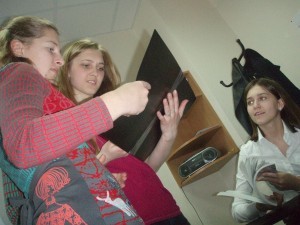Alex Poppe's Blog, page 3
November 23, 2012
One Long Bender
A friend of mine recently told me about a teaching opportunity in Angola for $6000 a month. That’s huge money for a person like me, and one year of it would pay for grad school. But what is the personal cost of living in another “anything goes” place?
Part of the problem is the dichotomy that exists between the local and the expat communities. Often jobs in this part of the developing world are located in countries steeped in religious fundamentalism. Because the local community is closed, expats tend to stick to themselves and unleash their hedonistic tendencies behind closed doors or compound walls as the case may be. It’s like everyone is on one long sexual bender because what happens “over here” doesn’t count. As long as you’re earning and saving money and don’t get fired or arrested (the barometer of Western respectability), a person can pretty much fool himself that he is doing “fine”. The more a person pushes the boundaries, the more he pushes the boundaries. It’s a slippery slope. I wonder if that’s what happened with General Petraeus. He had to have known he was making a mistake before that very first time he was unfaithful. There is always that moment before when you can choose to stop what you are doing or chose to consciously move forward.
Life on the expat government compounds is its own aberration. Some let their employees have restricted freedom to leave the compound under curfew for recreational purposes. To compensate, there is usually a bar and expats from outside the facility are encouraged to visit to spice things up for the people who can’t leave. Going to a party at one feels like you are being bussed in simply to ‘entertain” the gentleman folk who can’t leave. When I visit a friend on a particular base, the reason for my visit on access request forms is “Morale, Welfare, and Recreation”.
Some people who work on these compounds are not allowed to drink at all during their employment. When they go on their five week leave, they feel like have to “make up for it” and squeeze as much living into those five weeks as possible. For one friend of mine, that means endless drinking, gambling, and one night stands. Then he returns to his compound life and follows the straight and narrow. He has wondered what this lifestyle is doing to him in the long run. He realizes his life is out of balance and that it will be difficult returning to “normal” society when he permanently leaves contract work.
I do not hold myself above this behavior. What is it about the Iraqi desert that lets people feel like they can abandon sensibility in favor of momentary gratification? I bet Petraeus has asked himself a similar question. Or maybe it is not the desert at all, but my latent awakening to human nature.
A common thread seems to be restriction. There is so much constraint that when you’re given an inch, you take a foot. There was a Swedish sexual predator from Bagdad who recently was extradited back here without finishing his jail sentence. He had been convicted of over 50 counts of sexual assault including 11 counts of rape. His victims were mostly minors. His defense was when he moved to Sweden from Iraq, he had seen a young girl kissing a boy on a park bench and thought anything goes. He was able to find employment at a local high school until a parent recognized him and reported it. If there were universal laws to protect women’s rights, he wouldn’t have been released into the general population here. He might have been extradited into an Iraqi prison instead of working at a local high school.


October 29, 2012
Eid Mubarak from the Domiz Refugee Camp Outside Dohuk, Kurdistan, Iraq
Eid al Adha celebrates Ibrahim’s willingness to sacrifice his son to God. Typically, families slaughter an animal and give one third to the poor, one third to neighbors, and have a party with the rest. The festival also commemorates accomplishment. This Eid did not disappoint on either front.
A few colleagues and I were able to bring supplies to 11 of the 15 families identified by the UN as Syrian refugees in Erbil. ACTED (a French ngo) estimates there are at least 4000 displaced Syrians in Erbil alone. Outside Dohuk, the Domiz Camp population is estimated at 40-45,000, with hundreds arriving every day. These now homeless people serve as a constant reminder of the brutalities of war inflicted on innocent civilians.
In the spirit of giving, I helped the students at my school distribute food to some of the needy families in the Khanzad Region. Thinking like a Western, I initially didn’t understand when the teenage female students said they were afraid to distribute the food. I thought they felt uncomfortable because the recipients were really poor. I explained that there was nothing to be afraid of, as both they and I were very lucky to have been born under the circumstances that we had. What made them uneasy was the way the men who were there to pick up food and other supplies were leering at them and the comments they were making. I was shocked that the men were acting that way. Then I understood why the girls justifiably felt uncomfortable. I was uncomfortable. How can this cycle of intimidation and mistrust be broken?
A few days later I was hosted by the “Woman in Action” conference organizer for an Eid celebration. The party consisted of mostly female ngo workers. Inevitably stories of harassment were swapped as well as the additional insult to injury of reported complaints being ignored by the SI and the local police. Incidentally, there are an alleged 90 brothels in the Christian city of Ankawa alone. Some of the aid workers connect the increase in violence towards women to the proliferations of brothels.
There needs to be a fundamental change of thinking at the community level to affect real change in gender policies. Right now, only governmental lip service is given. Last year the government ministry hosted a gender sensitivity and training program for the local male police. The only question asked during the seminars concerned permission to go to the bathroom or to leave because the attendees were hungry. Not only do these attitudes increase hostilities across gender divides, but they are also bad business. Recently, a cab driver attempted to rape a female fare at gunpoint. When stories like this become common knowledge, foreign business will be less likely to invest here. Political terrorism may have lessened in the Kurdish Region, but sexual terrorism unfortunately abounds.
I have wanted to work in the field for an aid organization for some time. Today, Acted made that dream come true. I accompanied an international team (Canadian, Italian, and French) to the Domiz Refugee Camp to map it. During this process, surveyors mark points of interest such as community water collection points, public toilets, small shops, and drivable roads into a GPS tracker to pinpoint coordinates and on a physical map for future ngo purposes. Despite an incubating cholera epidemic, children in the camp ran around without shoes through mud and sewer water. There had been some incidents of rape, so single men had been moved to their own section. The refugees can move freely in and out of the camp, so many have jobs in the outlying towns. Some set up small shops. There are even a few restaurants, but given the cholera outbreak, we decided to abstain. I was most impressed with the children who ran around as kids do, shrieking, sometimes fighting with toy rifles, saying hello in English and darting away, or gathering around staring in fascination at the foreigners and their funny gadgets. To see kids that vibrant and hopeful despite the conditions begs the question: when we get to adulthood, how do we manage to f it up so spectacularly?


October 11, 2012
Hey Hezbollah
This week a friend of mine said that the problem with women is that they put up with bad male behavior, and that is why men get away with acting like idiots. He argued that if women called men out on and refused to accept their caddish ways, men would be forced to change their bad behavior. Until then women, apparently, had no right to complain.
It takes more than a complaint to affect change. It takes a willingness on the part of the status quo power brokers to share power. How many people do you know that are intrinsically generous instead of automatically self-centered? Moreover, how many of those people would share their power, status, or control with a woman? It may require a small miracle; it certainly requires a cultural adjustment.
I was deeply disturbed to hear about Malala Yousafzai, the 14 year old Pakastani girl gunned down by the Taliban for advocating for female education. Her activism was deemed “obscene” as she had become a symbol of Western culture (Declan Walsh, The New York Times, October 9, 2012). On Tuesday, at a risk to innocent children, the Taliban targeted and shot her in the head and neck on a crowded school bus.
The outlandish brutality caused by her desire to be educated is considered unfathomable in the largely democratic West because the West holds the desire for education as an inalienable right. How can you be killed for wanting to learn?
The question seems rhetorical except it is not when you consider that a woman in Morocco cannot prosecute an alleged rape in a court of law, or a woman in South Africa has a better chance of being raped than she does of becoming literate. It is easy to dismiss such examples as aberrations of poverty or the by-product of certain religious societies. I think that is a defeatist and complacent tactic.
When “The Innocence of Muslims”, a culturally derogatory and utterly nonsensical insulting film trailer, aired, Hezbollah called for an international mandate to prevent the defamation of the Islamic religion. Although it is pathetic that the world at large needs to be reminded to be respectful of what is different, the idea makes sense. Hey Hezbollah, why not extend that idea to women? With all due respect, religion is intangible, and ultimately personal. But women, our 14 year old daughters and sisters, are tangible and alive and largely unprotected. They make up over half the world. Studies show that when women control the finances in the households of developing nations, children eat better, stay healthier, stay in school longer, and become contributing members to their communities (Nicolas Kristof, Sheryl Wudunn, Half the Sky, 2009). What about an international mandate to protect them?
I complain. I complain that girls in school bathrooms are the victims of peeping toms. I was asked why the girls hadn’t pulled the shades down. I complain that I feel harassed by guards upon entering an accommodation. It was insinuated that I had drunk too much (I hadn’t, nor was the insinuator present at the time of the incident). When I am told that Kurdistan is safer than New York City, I complain that I have been grabbed between the legs in front of a shop in the early evening when escorted by a male friend, and that has never happened to me in New York City. It is still insisted that Kurdistan is safer than New York City. I guess the Great Gatsby reputation of New York lingers. As long as I am on a literary bent, let’s throw To Kill a Mockingbird into the mix. You can never know what it is like until you walk around in another man’s shoes. Until a man can magically turn into a woman for a day, he shouldn’t assume he can master the runway in heels.


September 15, 2012
Say What??
One of the reasons I had not wanted to return to Erbil was that I worried living here had made me more aggressive. In my experience, women are often ignored, refused, or denigrated unless they are being ogled, pursued, or threatened, especially if they are western. Yet, I had returned – for money, for love, for security (turns out the West Bank was more unsafe). These may or may not be valid reasons; why do any of us do anything? These thoughts were crisscrossing my mind as I zigzagged my way in and out of throngs of students when a particularly bright eleventh grader asked me why I had come back if I thought living in Erbil had changed me so. It was kismet. I looked into his big, bright, unveiled eyes and gave the most honest answer I could. I told him I didn’t know.
Actions are shaped by prior experiences. Is that learning from mistakes or becoming jaded? A friend of mine had stopped by the other day when there was a knock on my door. It was one of the workmen on the compound, whom I did not recognize. They are not supposed to knock on our doors, especially after an unfortunate incident last year when a pesh merga tried to force his way into one of the teacher’s flats. The workman asked me for water. Though I had just poured some for my guest, I told him I didn’t have any and I closed my door. Why did I do that? I am so ashamed by my behavior. Why didn’t I just give him a bottle of water? Clearly I don’t have a problem sharing it as I had just poured some for someone else. I didn’t even think about saying no; my refusal had been instinctual. Incidentally, the man who accosted me in the church tower in Jerusalem had drunk from my water bottle as soon as he entered the tower (I guess running up 130 plus steps to assault someone takes its toll). Am I wiser now and therefore acting accordingly? Or am I just not as nice as I used to be?
I’ve shared this story with a few women who live on the compound and they think I did the right thing. When refusing someone a basic necessity of life is doing the right thing, what does that say about the state of things? On the other hand, whenever I act in an ethical way outside of my cultural context, it blows up in my face. There is a driver who drives us frequently. I have never treated him as “just a driver”. One night last year I called him for taxi service and he ended up trying to kiss me on the way home. Now I pretend I am a haughty Miss Daisy when he drives. Recently, a Kurdish male colleague asked me for my phone number to invite me over to smoke shisha (the tobacco water pipe) and have something to eat or drink. Six months ago I would have thought nothing of accepting such an invitation as I would accept it in the States in an effort to get to know a new colleague better. I have learned that here, you can’t. He would not invite a Kurdish woman over to his house to smoke or drink. As a western woman, if I accept, it is like giving tacit permission to a whole other menu of activities. This is the kind of thinking I am expected to employ, or else I open myself up to a lot of trouble. I hate doing it because it renders cross cultural dialogue and gender equality almost impossible.
If we stop learning about each other, how will we achieve peace? That is one of the foundations of the Access Scholarship Program at AMIDEAST. They consider it “Peace through Education”. The organization takes some of the poorest kids in a conflict region, gives them an education in English, teaches them about American culture, and puts them in contact with an American teacher whom they will like so they won’t be tempted to become a terrorist later on in life. Unfortunately, fostering relationship outside an academic environment does not seem to work. Behavior gets misconstrued.
Cross cultural misunderstanding has been magnified to the nth degree over the last few days over that film which denigrates the prophet Mohammad. I find it ironic that the protests started in Cairo against America when it was an Egyptian Coptic Christian who had made the film. Not that I condone violent protest, but why aren’t Egyptian embassies abroad the targets of protests? Why has no one made that connection? It is easier to fear and therefore hate what you don’t understand. Unfortunately, it seems the world is destined to pop in a bubble of its own ignorance.


July 11, 2011
Creativity In Education: Guest Blog (updated)
Creativity In Education: Guest Blog (updated)
by StuHN in AIE, Arts, Arts Advocacy, Arts In Education, Arts Infusion, Arts Integration, Arts Reform, Blogging, Dialogue, Documentary, Drama Teacher, Education, Freedom, Learning, Schools, Teaching, Teaching Artist, Thinking, True Stories, Women Writers Tags: Anti Violence, Arts in Education, literacy, Media Education, Theater Education
It was by kismet-accident that I came across Sally “Alex” Poppe. While trying to find someone with a similar name on LinkedIn, I came across Alex’s profile and thought Comrade in Arms. We connected on the site and I had the extreme pleasure of meeting her for an enlightening meeting about websites, SEO’s…and education issues. We found a lot of commonality and it is my pleasure to have her write this very positive guest blog.
Bio: Sally “Alex” Poppe is a creative instigator with broad experience across Marketing, Education, Theatre Arts, and Consulting. She combines elements from all disciplines to develop strategy and exceed goals. Having worked in the United States, Scotland, Poland, Turkey, and Ukraine, she brings a global perspective and cultural curiosity to problem-solving. For a complete professional profile, please visit Sally “Alex” Poppe at LinkedIn.
Creativity is as important in education as literacy,” expounds acclaimed British educator and leader in the development of innovation and human resources Sir Ken Robinson.[i] As an ESL teacher in the United States and abroad, I have used traditional theatre techniques and Theatre of the Oppressed exercises in addition to traditional grammar and skills teaching to foster second language acquisition. These methods produce huge gains in communicative fluency and accuracy as measured by traditional test metrics and FCE, TOEIC, and TOEFL scores. More importantly, they also encourage students to explore their cognitive potential and foster camaraderie and team work. That is why I believe arts funding should come to the forefront of scholastic agenda formation. It should not be treated as a budgetary leftover.

The particular case study I will use for this discussion involves a group of ten 13 to 16 year-old Ukrainian girls I taught in a language school in Kiev during 2009–2010. Their English class was in addition to their regular academic curriculum and afterschool activities. In the spring, the school sponsored a project week where most classes make posters. Using four 90 minute periods these girls created and shot a 20 minute film in English. The entire process was conducted in English.
One of the reasons this project was so successful was because I had used theatre based techniques throughout the school year. The students were eager to participate because the activities were engaging. They could get out of their chairs, move around the space, become collaborators and architects in the progress of their own lessons. This inspired their trust in me and also in each other. Strong friendships were formed that existed outside of the classroom, even though the girls attended different high schools. I had similar feedback from my adult Ukrainian students which is remarkable because culturally students do not maintain their friendships outside the school. Getting the girls to agree on a theme for the film was a lesson in negotiation. I moderated with very limited input. Practicing speaking and listening skills, the girls brainstormed story ideas, met in small group to discuss story development, then voted on the plot they wanted to explore. Within this class session, we studied the idea of a story having a beginning, a middle, and an end, thereby practicing reading skills.
Once they had agreed on a story idea, we set to work on character.

During the next period, I led the class through a group of character building exercises based on theatre techniques developed by Tim Phillips (character as if), Moni and Mina Yakim (physical manifestation of character), and Andrea Haring (vocal center for the character). I used Theatre of the Oppressed techniques to discover what was at stake for their characters. The girls were interested because it was new for them and participated whole-heartedly. For them it was fun, and a break from traditional class work.
All creative work was practiced in the target language of English. Their writing homework that night involved creating their own character’s personal back story and imagining their character’s future. The writing homework synthesized many grammar tenses we had studied in traditional ways throughout the year. During the next session, the girls broke down the story into scenes which they wrote outlines for and then improvised in rehearsal. This session was gratifying for me because I could see them thinking and creating in the moment in the target language. They weren’t thinking about grammar or translating. They were creating in English. The last session was the day we shot the film. We did a rehearsal of each scene and shot a take. One student took the film home and edited it on a computer.

The story they chose to tell was a celebration of their friendship and a projection into the future of how their lives would be. I was touched they chose to celebrate their friendship, for they had truly become a team. The use of creative exercises had broken down physical barriers because they were often out of their seats doing non-traditional activities that required team work, trust, and cooperation. The projection into the future opened up their minds to all the possibilities available to them. I have since received poems and songs created by my students in their free time.
[i] Tischler, Linda. “IDEO’s David Kelley on ‘Design Thinking.’” Fast Company 1 Feb 2009.
Originally published at bornstoryteller.wordpress.com on July 12, 2011.





